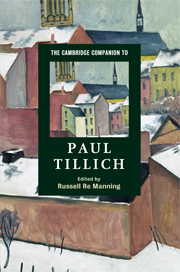Book contents
- Frontmatter
- Part I Standing within the theological circle
- Part II Theology of culture
- Part III Tillich in dialogue
- 14 Tillich in dialogue with natural science
- 15 Tillich in dialogue with psychology
- 16 Tillich in dialogue with Japanese Buddhism: a paradigmatic illustration of his approach to inter-religious conversation
- 17 Tillich and feminism
- 18 Tillich and the postmodern
- Bibliography
- Index
16 - Tillich in dialogue with Japanese Buddhism: a paradigmatic illustration of his approach to inter-religious conversation
from Part III - Tillich in dialogue
Published online by Cambridge University Press: 28 May 2009
- Frontmatter
- Part I Standing within the theological circle
- Part II Theology of culture
- Part III Tillich in dialogue
- 14 Tillich in dialogue with natural science
- 15 Tillich in dialogue with psychology
- 16 Tillich in dialogue with Japanese Buddhism: a paradigmatic illustration of his approach to inter-religious conversation
- 17 Tillich and feminism
- 18 Tillich and the postmodern
- Bibliography
- Index
Summary
In the Bampton Lectures, delivered in the autumn of 1961 at Columbia University, Tillich exemplifies his views on inter-religious dialogue with a conversation between a Christian and a Buddhist ('A Christian- Buddhist Conversation' in CEWR, 53-75). Portrayed as 'one of the greatest, strangest, and at the same time most competitive' religious traditions, Buddhism assuredly plays a major part in Tillich's late reflections on Christianity's encounter with the world religions (54). His visit to Japan in the late spring of 1960 has often been presented as the starting point of this special interest in the Christian-Buddhist dialogue; but, as Terence Thomas has compellingly argued, 'this visit to Japan was more of a culmination than a venture into a new world' ('The Protestant Principle and the Encounter of World Religions' in ERQR, xi). The first part of this chapter will examine in some detail Tillich's concrete practice of dialogue with major representatives of Japanese Buddhism both before and during his visit to Japan. The second part will analyse his systematic reflections on Christian-Buddhist dialogue. The conclusion will briefly evaluate its significance for Tillich's late theology of religions.
- Type
- Chapter
- Information
- The Cambridge Companion to Paul Tillich , pp. 254 - 272Publisher: Cambridge University PressPrint publication year: 2009
- 3
- Cited by



